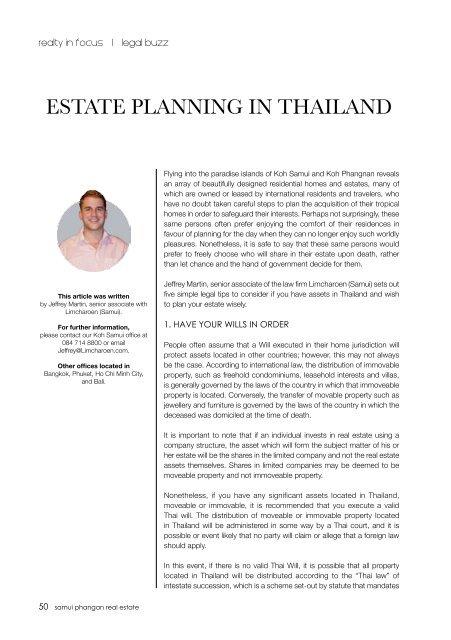You also want an ePaper? Increase the reach of your titles
YUMPU automatically turns print PDFs into web optimized ePapers that Google loves.
ealty in focus l legal buzz<br />
ESTATE PLANNING IN THAILAND<br />
This article was written<br />
by Jeffrey Martin, senior associate with<br />
Limcharoen (<strong>Samui</strong>).<br />
For further information,<br />
please contact our Koh <strong>Samui</strong> office at<br />
084 714 8800 or email<br />
Jeffrey@Limcharoen.com.<br />
Other offices located in<br />
Bangkok, Phuket, Ho Chi Minh City,<br />
and Bali.<br />
50 samui phangan real estate<br />
Flying into the paradise islands of Koh <strong>Samui</strong> and Koh Phangnan reveals<br />
an array of beautifully designed residential homes and estates, many of<br />
which are owned or leased by international residents and travelers, who<br />
have no doubt taken careful steps to plan the acquisition of their tropical<br />
homes in order to safeguard their interests. Perhaps not surprisingly, these<br />
same persons often prefer enjoying the comfort of their residences in<br />
favour of planning for the day when they can no longer enjoy such worldly<br />
pleasures. Nonetheless, it is safe to say that these same persons would<br />
prefer to freely choose who will share in their estate upon death, rather<br />
than let chance and the hand of government decide for them.<br />
Jeffrey Martin, senior associate of the law firm Limcharoen (<strong>Samui</strong>) sets out<br />
five simple legal tips to consider if you have assets in Thailand and wish<br />
to plan your estate wisely.<br />
1. HAVE YOUR WILLS IN ORDER<br />
People often assume that a Will executed in their home jurisdiction will<br />
protect assets located in other countries; however, this may not always<br />
be the case. According to international law, the distribution of immovable<br />
property, such as freehold condominiums, leasehold interests and villas,<br />
is generally governed by the laws of the country in which that immoveable<br />
property is located. Conversely, the transfer of movable property such as<br />
jewellery and furniture is governed by the laws of the country in which the<br />
deceased was domiciled at the time of death.<br />
It is important to note that if an individual invests in real estate using a<br />
company structure, the asset which will form the subject matter of his or<br />
her estate will be the shares in the limited company and not the real estate<br />
assets themselves. Shares in limited companies may be deemed to be<br />
moveable property and not immoveable property.<br />
Nonetheless, if you have any significant assets located in Thailand,<br />
moveable or immovable, it is recommended that you execute a valid<br />
Thai will. The distribution of moveable or immovable property located<br />
in Thailand will be administered in some way by a Thai court, and it is<br />
possible or event likely that no party will claim or allege that a foreign law<br />
should apply.<br />
In this event, if there is no valid Thai Will, it is possible that all property<br />
located in Thailand will be distributed according to the “Thai law” of<br />
intestate succession, which is a scheme set-out by statute that mandates



